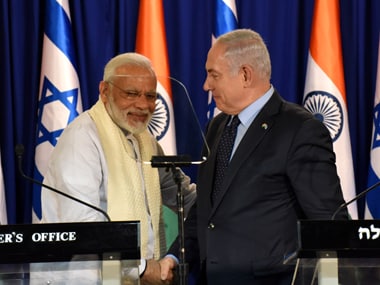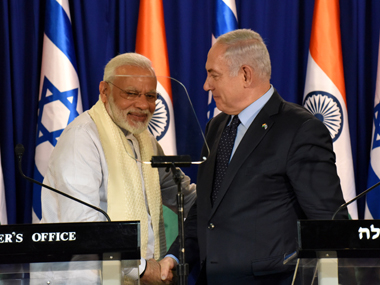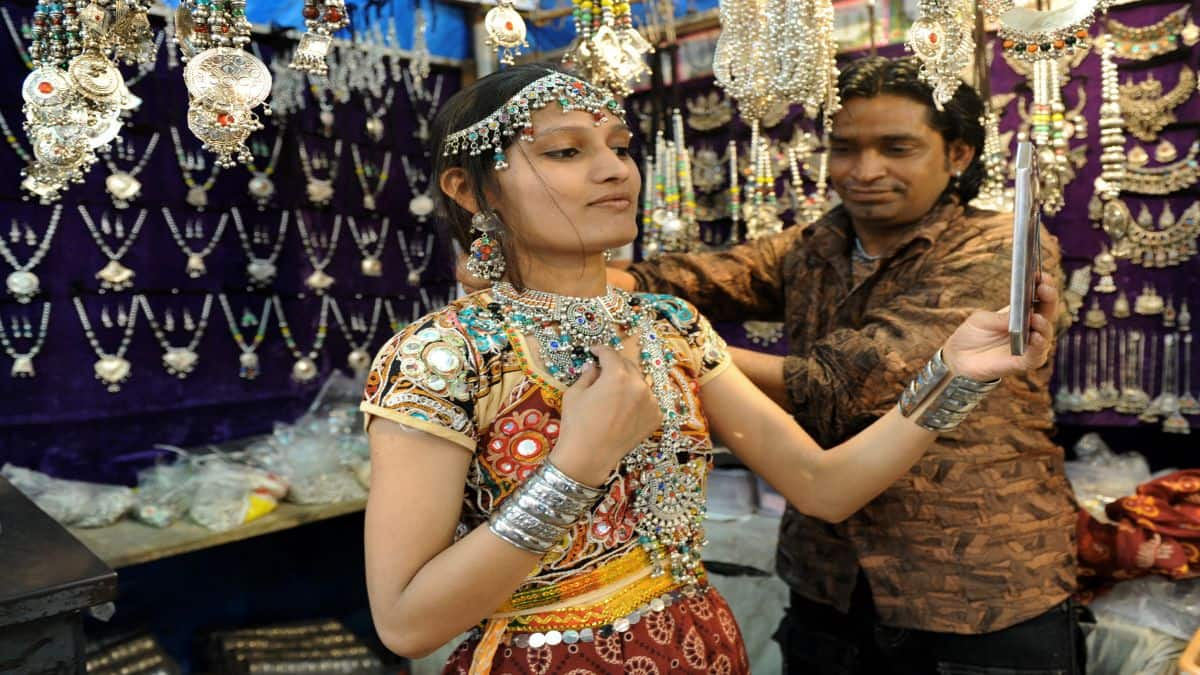Broadly speaking, India-Israel ties can be summed up by segmenting them into three parts. The first begins from 17 September 1950, when India officially recognised the state of Israel. But in the recognition was a painful awareness. India did not recognise Israel on 14 May 1948 when it declared itself as an independent state. As India’s first prime minister remarked, “We would have (recognised Israel) long ago, because Israel is a fact. We refrained because of our desire not to offend the sentiments of our friends in the Arab countries.” In 1953, Israel was permitted to open a consulate in Bombay (now Mumbai). But the desire “not to offend” did not permit the government to allow Israel full diplomatic status till January 1992. During the interim period many Israeli officials visited India – sometimes in the full glare of publicity, sometime clandestinely. [caption id=“attachment_3777677” align=“alignleft” width=“380”]  Prime Minister Narendra Modi with his Israeli counterpart Benjamin Netanyahu. Reuters[/caption] The second phase begins from January 1992 when – in keeping with the decision to usher in liberalisation of the economy - India accorded full diplomatic status to Israel. Trade blossomed. And even though Israel ranked among the top 10 countries with which India enjoyed economic ties, the total non-military trade between the two countries was just around $4.5 billion. Of course, this did not include military purchases. But neither country likes to talk about it. The fact is that even when Israel did not enjoy full diplomatic ties with India, it remained one of the largest supplier of military technology and services to India. After all, Israel remains one of the top 10 arms exporters in the world. And watch how the numbers have been accelerating in recent years. But almost everyone knows that the figures involved are huge. If one goes by media reports, from 1999 to 2009, the military business between the two nations was worth around $9 billion. Compare this with the $2 billion air and missile defense deal that the two countries signed in April this year, which was described as the “largest defense contract deal” in its history.  The third, and perhaps the most momentous phase in the relations between the two countries began on 4 July when Modi became the first Indian prime minister to set foot on Israeli soil. The event is considered extremely significant for Israel too. No less than the prime minister of Israel, Benjamin Netanyahu, has ensured that he will be with the Indian prime minister for all the three days that he is there. No other foreign dignitary has received as much of attention as India has in that country. In fact, 10 days earlier, on 25 June 2017, Netanyahu announced the Israeli government’s approval of the “Israeli Cabinet Resolution on Strengthening Ties with the Republic of India”. This resolution is a direct result of the Israeli prime minister’s instructions to concentrate governmental efforts on strengthening political, economic, scientific and cultural ties with India. Celebrating 25 years of Indo-Israel diplomatic relations, the government resolution aims at combining the capabilities of both the Indian and Israeli economies for the benefit of both countries. The reasons are many. For one. Between Japan and Europe, there are only two real democracies in the world – Israel and India. Second, both countries face similar opportunities and even threats, and when such interests coincide, it is not unusual for them to seek out ways to work together. Third, both countries have similar cultural backgrounds. Both are ancient civilizations. In fact, more than India, almost every Israeli boy or girl travels either to India or to Latin America after his or her military service is over. Both cultures feel comfortable with each other. So what should one expect from the visit of Narendra Modi to Israel. Certainly, there will be talk of military cooperation. But neither side will speak of it. Then there are some key areas which are of crucial interest to India – both economically and politically. India needs to double its farm income to improve the living standards of its farmers. That is both an economic and political imperative. No other country has been successful in improving productivity on the farm front as Israel has. Anecdotes of how Israeli companies have transformed agriculture in Indian states like Gujarat and Jharkhand are legendary by now. Expect agreements relating to agriculture to be high on the list. Not that Israel has not been involved with India on this front. It has already set up 15 centres of excellence for a variety of crops in India and hopes to increase this to 26 centres in around 11 states in this country. In Maharashtra, alone it has 4 centres of excellence. Each centre focuses on a specific crop relevant to that region. Most of these centres are set up on the lands of agricultural universities, and often act as demonstration farms as well. The second on the list could be water. “That is bound to be so,” explains David Akov, consul general of the Israeli consulate in Mumbai. “India has 17 percent of people in the world, but only 4 percent of water.” This means focusing on water recycling, water management and even desalination if required. The management of water technology is an area which Israel excels in. Then there will be agreements relating to innovation and research and development, space, cyber, health and more. In addition, the resolution has placed an emphasis on bringing the modern people of two ancient nations closer together, through deepening cultural ties and by encouraging tourism. Expect more government to government tie-ups followed by more and more joint ventures between businesses. Israel has already begun talking to developers and planners about how to plan smart cities, with a focus on homeland security and cyber security. It has begun talking to insurance companies and agricultural experts (besides defence experts as well) about sharing its technology relating to drones, which could provide better field surveys than was possible earlier. And it has begun talking about health sciences as well. This could mean more interactions, more celebrations and more raising of glasses to the chorus of “L’Chaiam”.
Expect more government to government tie-ups followed by more and more joint ventures between businesses
Advertisement
End of Article


)

)
)
)
)
)
)
)
)



